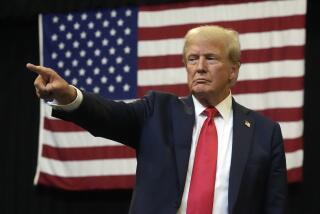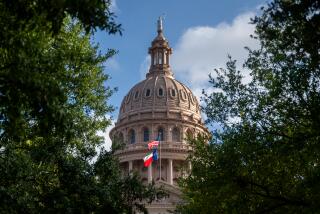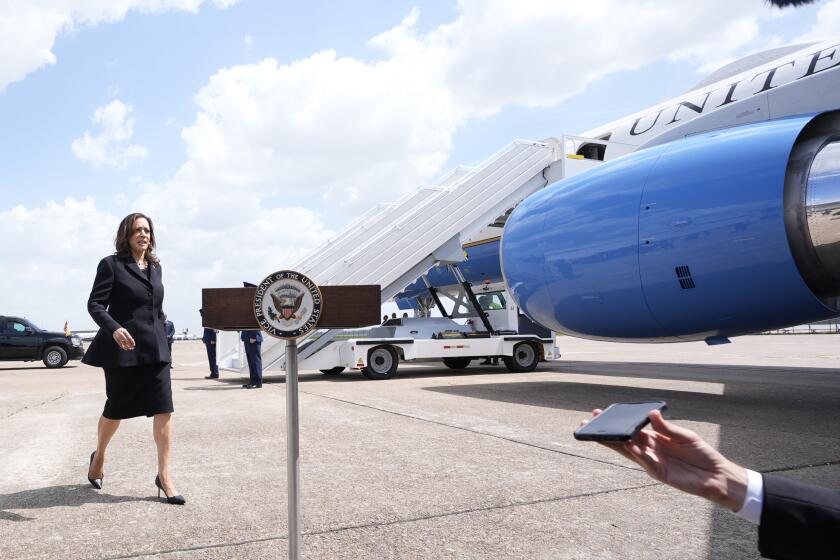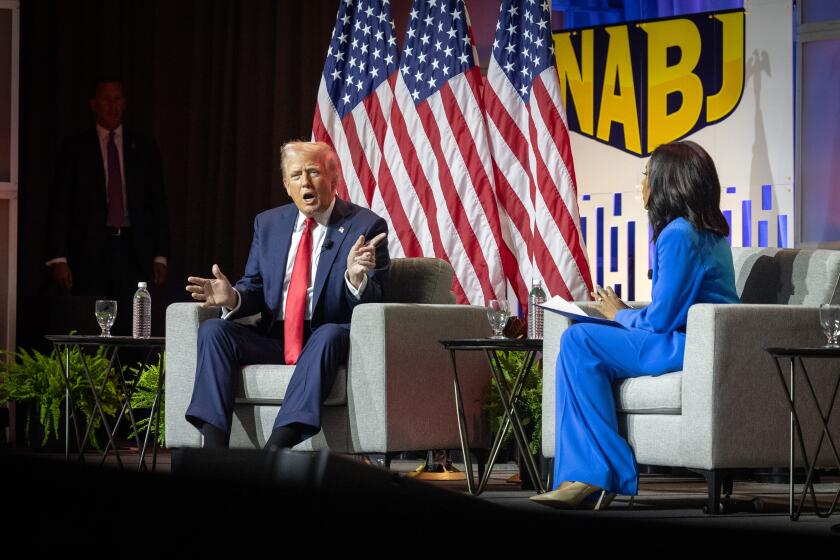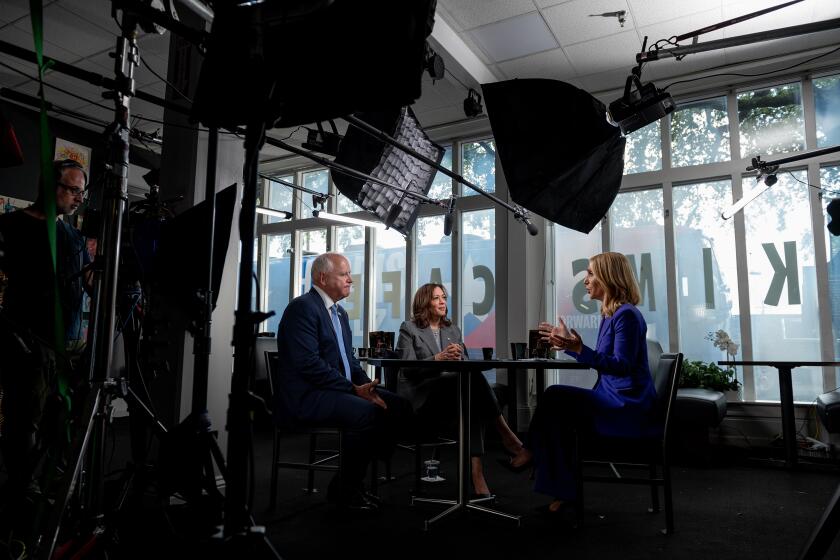House stiffens ethics rules
In the most sweeping overhaul of congressional ethics rules since the Watergate era, the House on Tuesday overwhelmingly approved a bill aimed at curbing the influence of lobbyists and repairing Congress’ corruption-sullied image.
Democrats promised to pass the measure after they won control of Congress following a campaign that denounced the Republican “culture of corruption” on Capitol Hill.
The legislation is one of a number of accomplishments that the majority party, ridiculed by Republicans for its slim legislative record, hopes to deliver before lawmakers break at the end of the week for a monthlong recess. The Senate plans to approve an identical bill this week and send it to President Bush for his signature.
The bill would impose new rules on lawmakers and lobbyists, requiring reports on the campaign checks that lobbyists solicit from different contributors and denying congressional pensions to lawmakers convicted of felonies. It would even bar senators-turned-lobbyists from setting foot in the Senate gym.
“If there was one message that was abundantly clear based on the results of last year’s election, it was that the American people want us to end the culture of corruption that has enveloped the legislative process,” said Rep. John Conyers Jr. (D-Mich.), chairman of the House Judiciary Committee. “We’ve heard that message loud and clear.”
The bill’s 411-8 approval comes after two former Republican lawmakers -- Rep. Randy “Duke” Cunningham of Rancho Santa Fe and Rep. Bob Ney of Ohio -- and former lobbyist Jack Abramoff were sent to prison on corruption charges.
About a dozen current and former lawmakers, including two other California Republicans, have come under scrutiny. Just this week, federal agents involved in a public corruption investigation searched the Alaska home of Sen. Ted Stevens, the chamber’s longest-serving Republican. Stevens has denied any wrongdoing.
Bob Edgar, a former Democratic congressman from Pennsylvania who heads the government watchdog group Common Cause, lauded Tuesday’s House action. “It was kind of a surprise to us that it passed as overwhelmingly as it did, as quickly as it did,” he said, saying the congressional agility was a response to widespread voter anger. “They want Congress to clean up its act.”
The bill would, for the first time, require disclosure of campaign contributions that lobbyists collect from clients, friends and others and then take credit for raising. The practice, known as bundling, is a major source of lobbyists’ influence over Washington politicians. The bill would require congressional and presidential campaigns to report bundled donations of $15,000 or more collected in a six-month period.
The legislation also aims to end the process that has allowed lawmakers to secretly slip special-interest appropriations -- often at a lobbyist’s behest -- into legislation. It would require disclosure of the names of the lawmakers behind the spending requests. Earmarking has figured prominently in the congressional scandals.
Under the bill, lobbyists would have to disclose their activities more often; pay fines of as much as $200,000, raised from a maximum $50,000, for willful violations; and face a new criminal penalty of as long as five years in prison for “knowingly and corruptly” violating the rules.
It also would bar lawmakers from attempting to pressure businesses into hiring lobbyists based on their political affiliation -- a practice promoted by former House Majority Leader Tom DeLay (R-Texas) and others who succeeded in strong-arming lobbying firms into hiring more Republicans.
Some of the rules would differ between the House and the Senate.
The bill would double, to two years, the period in which former senators would be barred from lobbying Congress. But in the House, where dozens of ex-lawmakers have cashed in on lucrative lobbying jobs, the one-year “cooling off” period would remain unchanged.
“The House and Senate are two different bodies, with the House having a higher turnover rate than the Senate,” said Brendan Daly, a spokesman for House Speaker Nancy Pelosi (D-San Francisco). “We made compromises along the way to pass the most critical part of the bill -- bundling.”
On the other hand, the House took a stricter view of its members flying on corporate-owned jets, banning the practice. Senators, who travel all over their states, and presidential candidates, who crisscross the country, would be permitted to fly on corporate jets but would have to pay charter rates -- instead of the less-costly equivalent of a first-class ticket.
“There is no reason why senators, or anyone else, should not be able to buy a good or service if they pay fair market value,” said Jim Manley, a spokesman for Senate Majority Leader Harry Reid (D-Nev.).
The House in January banned lobbyist-paid gifts, meals and travel. Under the bill, senators and their staffs would also be barred from accepting gifts and meals from lobbyists. They could take trips paid for by nonprofit groups, but lobbyists could not come along.
Government watchdog groups hailed the measure as “landmark reform.”
“For the first time, citizens will be able to get a full picture on how lobbyists and lobbying organizations use money in Washington, D.C., to gain access and influence in Congress,” said Fred Wertheimer, president of Democracy 21, a nonprofit that has worked to reduce the role of money in politics.
Lobbyists, however, questioned how much it would change the way business is conducted. “It’s not going to change how we do our jobs as far as educating members of Congress and staff on the issues,” said Paul Miller, former president of the American League of Lobbyists. “You just can’t do it over lunch.”
Congress last approved a major overhaul of ethics and lobbying rules in 1995, a measure that required lobbyists to register their clients and disclose the issues they were supporting.
Some lawmakers said they would continue to press for deeper change, including the creation of an independent office charged with investigating ethics complaints -- a job that’s now done by the ethics committees in both houses.
“We will celebrate the progress today, but we can’t stop,” said Rep. Christopher S. Murphy (D-Conn.), who won election last year by highlighting ethics.
All California House members voted for the measure.
Rep. Neil Abercrombie of Hawaii, who was among six Democrats who voted against the measure, called the bill “window dressing.”
“True lobby reform must put limits on political contributions and campaign expenditures,” he said in a statement.
Other Democrats voting against the measure were Emanuel Cleaver II and William Lacy Clay, both of Missouri, John P. Murtha of Pennsylvania, Allen Boyd of Florida and John Tanner of Tennessee.
Rep. Jeff Flake of Arizona and Rep. Joe L. Barton of Texas were the only Republicans to oppose the measure.
Flake said the bill did not go far enough to crack down on earmarking. “Until Congress concedes that our own practices contributed to recent scandals as much as the actions of corrupt lobbyists, lobbying reform will not be truly effective,” he said.
Rep. Jerry Lewis (R-Redlands) has come under scrutiny for his ties to lobbyists whose clients have received millions of dollars in earmarks from the appropriations committee that he once chaired.
And Rep. John T. Doolittle (R-Roseville) and his wife, whose home was searched by the FBI earlier this year, are being investigated for their ties to Abramoff. Lewis and Doolittle have denied wrongdoing; both voted for the ethics measure.
Democrats also have come under an ethical cloud, with Rep. William J. Jefferson (D-La.) being indicted after FBI agents reported finding $90,000 in cash stuffed in his freezer.
Ironically, the measure passed Tuesday, dubbed the Honest Leadership and Open Government Act, was drafted behind closed doors.
The Senate in January approved a bill to overhaul lobbying rules, and the House acted in May. But objections from Sen. Jim DeMint (R-S.C.) -- who contended the rules to spotlight earmarks didn’t go far enough -- stymied Democratic efforts to begin House-Senate negotiations to draw up a final bill.
Democratic leaders, eager to complete work on the bill before breaking for their summer recess, decided to work out their differences behind closed doors and have each chamber pass identical versions.
Complaining about the way the Democrats chose to advance the bill after pledging to lead a more open and bipartisan Congress, Rep. David Dreier (R-San Dimas) said that he wasn’t even able to get a copy of the bill until shortly before the vote.
“I got my first copy from a lobbyist,” he said.
--
(BEGIN TEXT OF INFOBOX)
About the measure
Key provisions in the ethics bill passed Tuesday by the House:
* Lawmakers must disclose those lobbyists who raise $15,000 or more for them within six months by “bundling” campaign donations from numerous givers.
* Senators seeking a special spending project or “earmark” must disclose it two days before a vote, and certify that they and their immediate relatives have no direct financial interest in it. (The House adopted similar requirements in January.)
* Leaders of the majority party, not the Senate parliamentarian, would rule on whether the earmark disclosure requirements had been met.
* Senators and candidates for the Senate and the White House must pay full charter fare when traveling on private airplanes. House members and candidates may not accept trips on private planes.
* Senators and their staffs may not accept gifts from lobbyists and their clients. (The House adopted a gift ban in January.)
* Former senators must wait two years before lobbying Congress in person. Ex-House members and top congressional aides must wait one year.
* Lawmakers convicted of bribery, perjury or similar crimes would lose their congressional retirement benefits.
* Lobbyists must disclose payments made to presidential libraries, inaugural committees or organizations controlled by, or named for, members of Congress.
* Lawmakers and their aides may not try to influence hiring decisions by lobbying firms and others in exchange for political access.
* Lawmakers may not attend large parties given in their honor by lobbyists at national political conventions.
Source: The Associated Press
More to Read
Get the L.A. Times Politics newsletter
Deeply reported insights into legislation, politics and policy from Sacramento, Washington and beyond. In your inbox three times per week.
You may occasionally receive promotional content from the Los Angeles Times.
